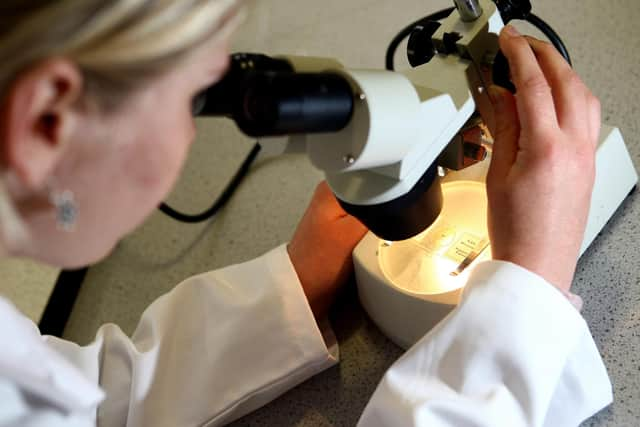Scottish scientists make major discovery in battle to treat cancer
Scientists in Dundee have discovered how some cancer drugs can target the disease while sparing healthy tissue.
According to Cancer Research UK, which funded the research, the discovery “paves the way to finding new and kinder treatments”, which are more effective at killing cancer and have fewer side effects for patients.
Advertisement
Hide AdAdvertisement
Hide AdEvery year, around 34,100 people are diagnosed with cancer in Scotland, with 16,300 Scots losing their lives to the disease annually.


Cancer treatments such as chemotherapy can be difficult for patients as the treatment usually affects all cells, not just the cancer cells, and can make some people feel unwell. The team at the University of Dundee claim their findings explain how a class of anti-cancer drugs is able to effectively target cancer cells while leaving healthy cells relatively untouched.
The research focused on established cancer treatments known as CDK4/6 inhibitors, which work by stopping cancer cells from replicating.
Senior author Dr Adrian Saurin, from the University of Dundee, said the answer “was quite simple in the end”.
“Oncogenes cause cancer cells to grow and divide uncontrollably, so when you stop their division with CDK4/6 inhibitors, they are then programmed to just grow excessively,” he said. “This overgrowth soon becomes toxic for cancer cells.
“The really exciting finding is that these drugs can turn oncogenes against cancer cells. That could explain why they produce toxic effects in cancer cells rather than healthy cells.”
A second team, involving researchers from the University of Dundee and the Medical Research Council Laboratory of Medical Sciences at Imperial College London, sought to find out why cancer cells stopped dividing permanently when they became too large. They discovered that being too large triggers chemical stress, which prevents these massive cells from replicating.
One of the senior authors, Dr Tony Ly, from the University of Dundee, said: “A surprising finding was that these CDK4/6 inhibitors made cancer cells become much larger than they should be. We showed that being too large produces a cellular stress response causing cells to enter senescence, a protective type of dormancy that prevents cancer cells from further dividing.”
The Dundee researchers hope this work will allow further treatments to be identified which also target these processes.
Comments
Want to join the conversation? Please or to comment on this article.